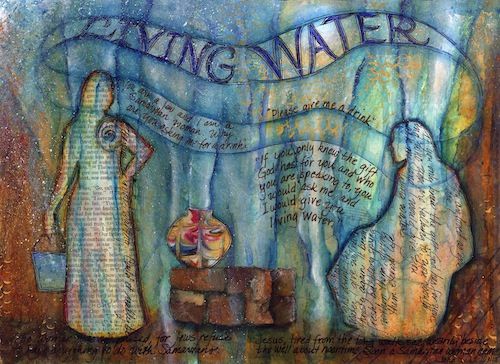3rd Sunday of Lent (Year A readings); St. Adalbert and St. Casimir parishes
We all know the experience of being thirsty. That tickle in our throat, that as thirst grows worse can become more uncomfortable, and then painful. Maybe it comes with a headache, or with fatigue. Thirst is actually quite hard to describe, because it’s so basic to being alive: being thirsty feels like thirst and we know what that feels like. We also know how good a cool glass of water feels on a hot day. Our first two readings use those feelings we all know so well and name something equally basic to being human: the reality that we are thirsty people and God refreshes us.
In the reading from Exodus, the Israelites are
thirsty because they are walking through the desert. Their thirst is so
powerful that they begin to think that even being back in slavery would be
better than being free and thirsty. God hears their cry and God gives them
water.
Our second reading, from St. Paul, uses that
experience of thirst to name something we feel in our hearts, something even
deeper than the thirst for water. He says that the love of God has been poured
into our hearts. And who but God, acting through the Holy Spirit, thanks to the
sacrifice of Christ, could do that pouring? Paul doesn’t need to name the
thirst. We know how a lack of love makes us feel. It’s far more painful than
how the back of our throat feels when we’re thirsty. That’s true when we feel
unloved, and that’s true when we recognize our failure to love as we dream of loving.
We were made from love and for love, and any lack of that leaves us parched. But
God refreshes. God pours love into our hearts like a tall cool glass of water.
And God is not stingy in His pouring. God pours in a way that is over-flowing.
God loves us so, so that we might love, so that people might have their thirst
begun to be quenched through us, even as we then lead them to encounter God,
the true source of all that refreshes, God who is love.
This is exactly what we see happening in the
gospel. The woman goes to the well to get water at noon. Why? Well, because she
needed water. But why at noon? Noon in a hot climate is not the best time to do
your well run. And leaving the village alone is not normally a safe thing to
do. Maybe, and we’re left with guesses about this woman, maybe she chose noon
precisely because it was not a popular time to go to the well. Maybe she was
not just lacking in water, but in community, not just having no one to go with,
but really preferring not to be around others. She was thirsty, for water, and
maybe for people too; something that might feel very real to some here,
especially as the isolation of physical distancing grows longer and longer for
some.
Jesus’ good news for her, for us, is not just
that he will quench any thirst, but that his water will in fact become in each
of us who believe a spring of living water, that can be part of how God
quenches the thirst of others. That’s precisely what happens with this woman,
who not just comes to faith in Jesus, but then shares that and invites others
into that relationship. Her fellow Samaritans express that in a slightly odd
way at the end of the reading, saying, “We no longer believe because of your
word, for we have heard for ourselves.” A more appropriate thing
to say there might have been “thank you.” This woman who may have been isolated
at the beginning is still pushed to the side at the end. And the good news is
that she still has that thirst-quenching relationship with Jesus. But the
Samaritans seem to be happy to ignore her now she’s shown them Jesus.
That’s not the fullness of what we’re called to. Christ
forged community on the cross, entrusting his mother and the beloved disciple
to one another, not just to remember that the Spirit would be in their hearts.
The love that’s been poured into our hearts should overflow. Our Catholic
appreciation for tradition is at its heart a recognition that our encounter
with Christ is brought to us through the hands of so many people who hand on
the good news to us, and we love and honor those who tradition the tradition,
people like St. Casimir who we celebrate this weekend. Our faith in Christ
should be personal, definitely, but never individual, never private. And I
think that’s a lot to do with why social isolation is hard. Because Christ is
always present to us, and it’s not that Christ isn’t enough, but that the love
of God that has been poured into our hearts is living water, water that wants
to overflow and connect and encounter Christ through loving relationship.
There’s one last person whose thirst I haven’t
yet talked about: Christ. Jesus was thirsty for water at the beginning of this
gospel passage. Near the end though, he says that his hunger, and his thirst
too, is satisfied when he does God’s work. Jesus did thirst for water, but in
so much deeper a way he thirsted, and still in some ways thirsts, for us, for
us to live the lives of over-flowing love from which and for which we were
made. In Christ, God quenches thirsts: ours, and His. In this Eucharist, let us
be filled, and then let us overflow.

No comments:
Post a Comment